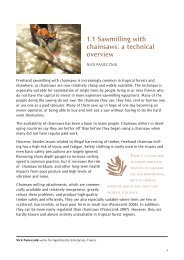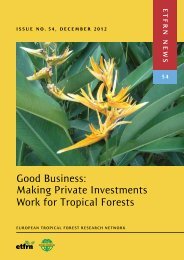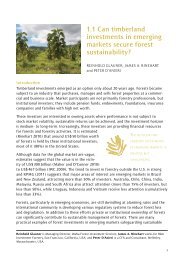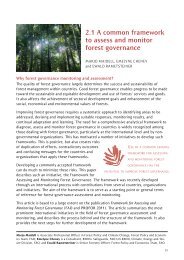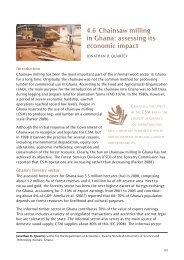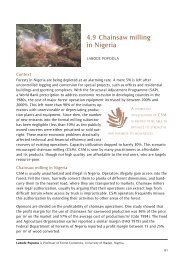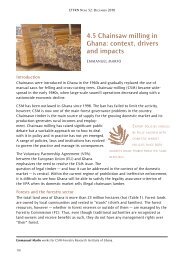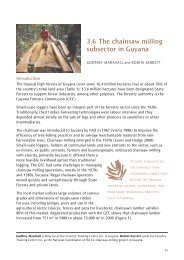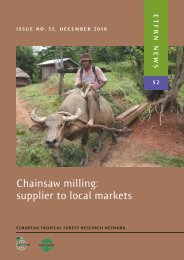Chainsaw milling: supplier to local markets - European Tropical ...
Chainsaw milling: supplier to local markets - European Tropical ...
Chainsaw milling: supplier to local markets - European Tropical ...
You also want an ePaper? Increase the reach of your titles
YUMPU automatically turns print PDFs into web optimized ePapers that Google loves.
4.5 chaiNsaw milliNg iN ghaNa: coNTExT, DRivERs aND impacTs<br />
Environmental impacts<br />
The most pervasive argument against Csm is its negative environmental impact. marfo,<br />
adam and obiri (2009) noted several negative environmental consequences compared <strong>to</strong><br />
conventional logging:<br />
• logging intensity can be as high as seven trees/ha, which exceeds the standard of two<br />
<strong>to</strong> three trees/ha;<br />
• some valuable tree species are felled below recommended size limits;<br />
• most chainsaw opera<strong>to</strong>rs do not practise directional felling — this can lead <strong>to</strong> the<br />
destruction of young trees and agricultural crops; and<br />
• chainsaw opera<strong>to</strong>rs have invaded ecologically sensitive sites such as Globally<br />
significant biodiversity areas and convalescent areas of production forest reserves.<br />
The problems related <strong>to</strong> Csm seem <strong>to</strong> stem from lack of technical skills and from the<br />
illegal framework within which it operates. a regularized environment could support<br />
administrative development and capacity building <strong>to</strong> address issues such as directional<br />
felling, logging intensity and choice of sites.<br />
conclusions<br />
Ghana is in a dilemma as <strong>to</strong> how <strong>to</strong> deal with Csm in both policy and practice. a specific<br />
economic, social and political environment drives Csm. most stakeholders recognize that<br />
it is important both as an employer of rural youth and a <strong>supplier</strong> of domestic timber.<br />
regularization or eradication of Csm would adversely affect the rural economy and the<br />
enterprises that depend on it for lumber. it would also reduce employment and incomeearning<br />
opportunities for rural people.<br />
if the current level of exploitation continues, however, a serious shortage of merchantable<br />
trees is imminent. Ghana would lose much of its remaining forest and the services they<br />
provide. based on the estimated Csm harvest of about 2.5 million m 3 and the aaC of 2<br />
million m 3 , the annual harvest can be estimated at about 4.5<br />
million m 3 . This is approximately four times the<br />
recommended allowable cut — a figure that is itself<br />
probably outdated.<br />
The current regime of benefit sharing — which alienates<br />
communities — needs major restructuring in order <strong>to</strong> gain<br />
community support for the management of forest resources.<br />
Tenure reforms that recognize some ownership or management<br />
rights on the part of communities, especially outside<br />
forest reserves, are an important consideration.<br />
The ratification of the Eu-Ghana Vpa in 2009 further<br />
emphasized the need <strong>to</strong> address the Csm issue. if Ghana is not able <strong>to</strong> assure the legality<br />
of the domestic market, including Csm, the country’s export trade with the Eu is likely <strong>to</strong><br />
be affected. a strict implementation of the Vpa — with its legal assurance systems and<br />
law enforcement — could spell the end of Csm, which provides a living for hundreds of<br />
155



